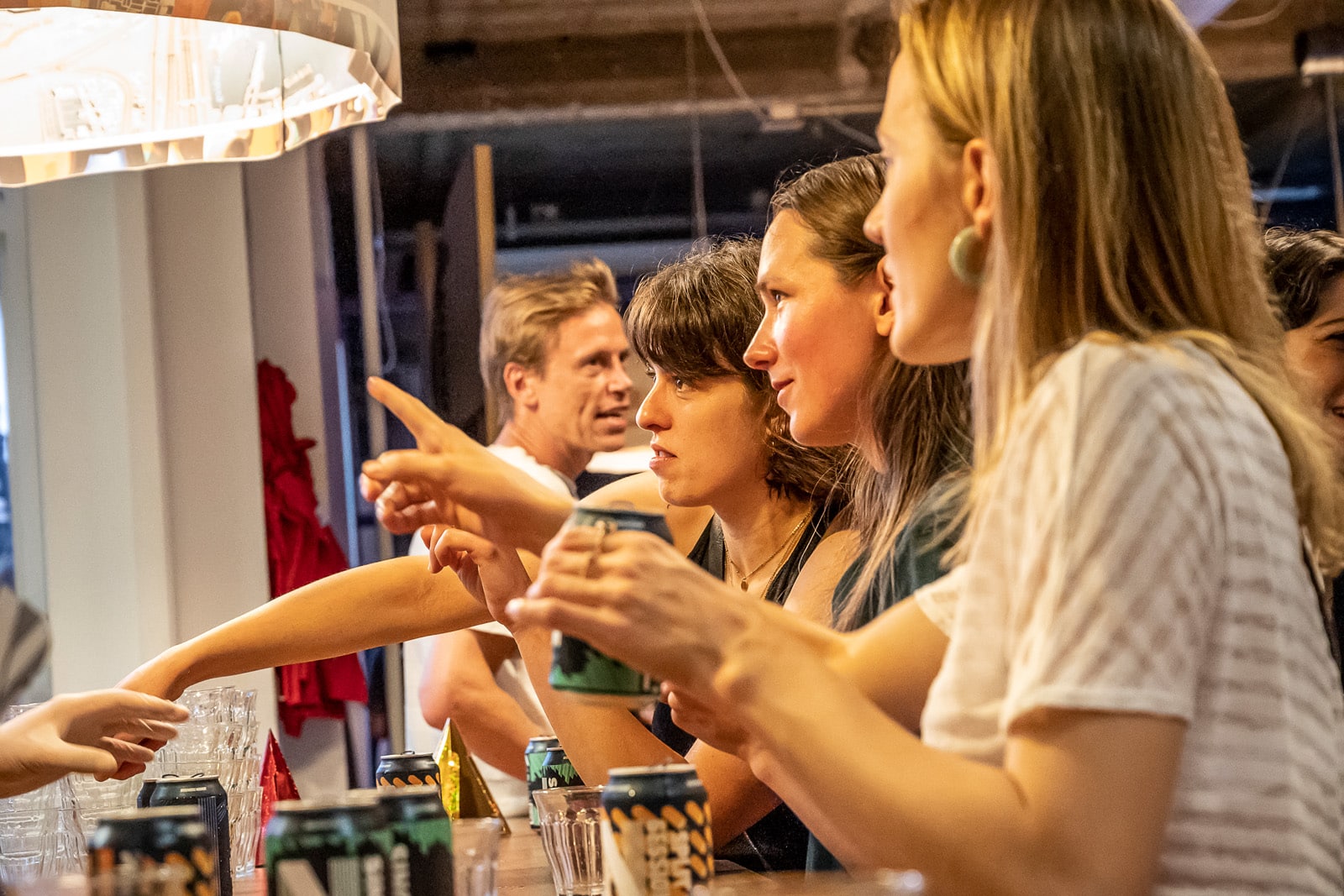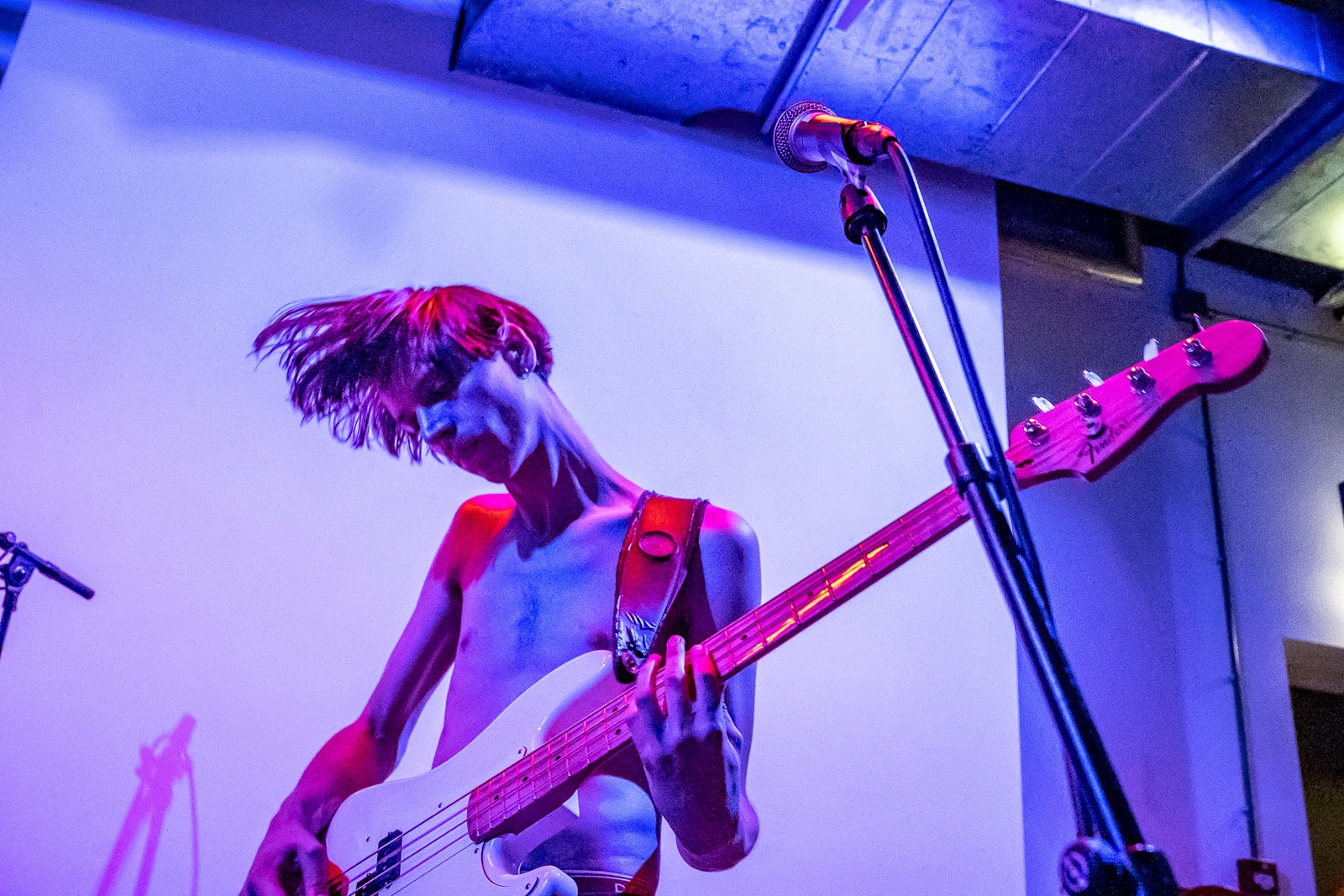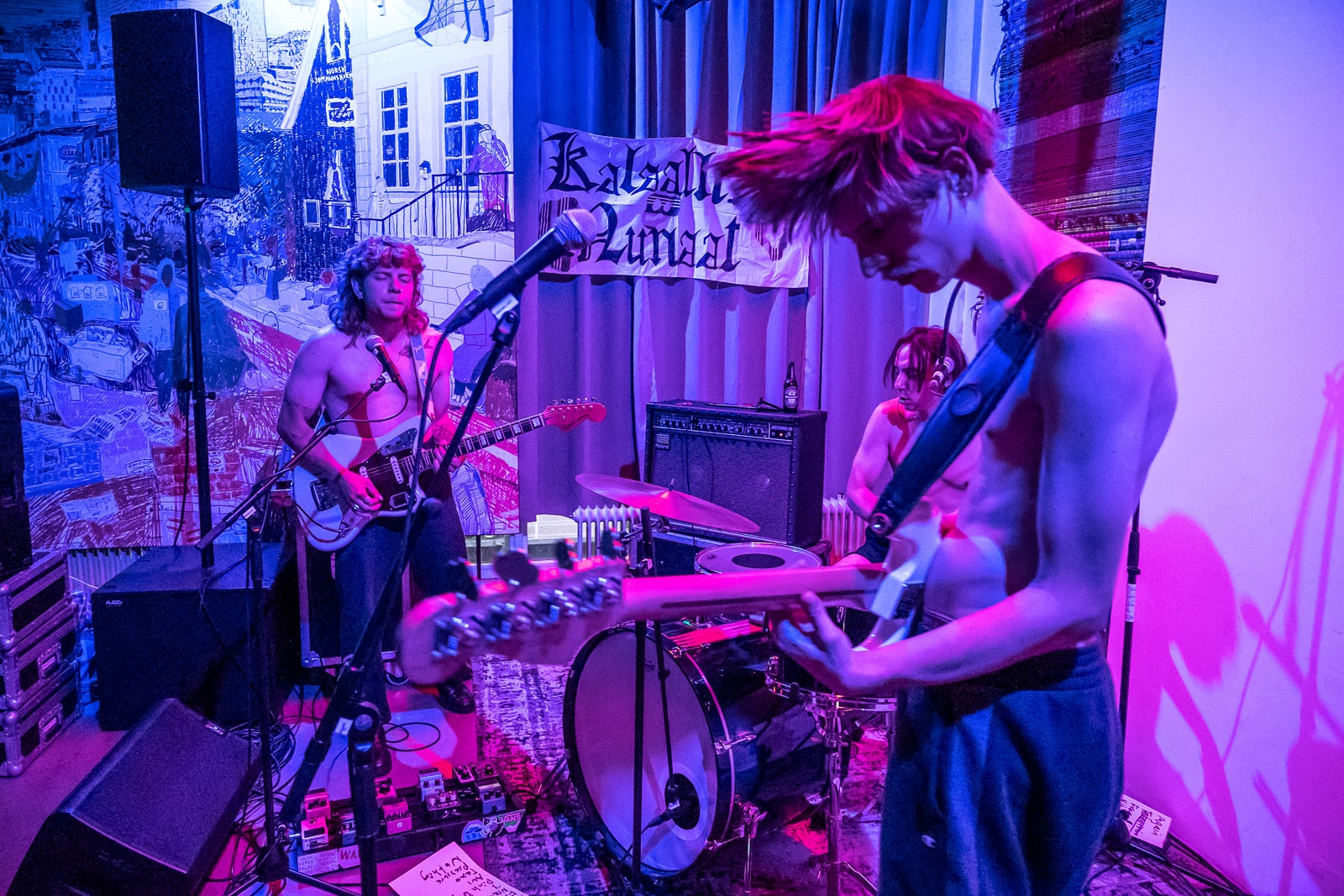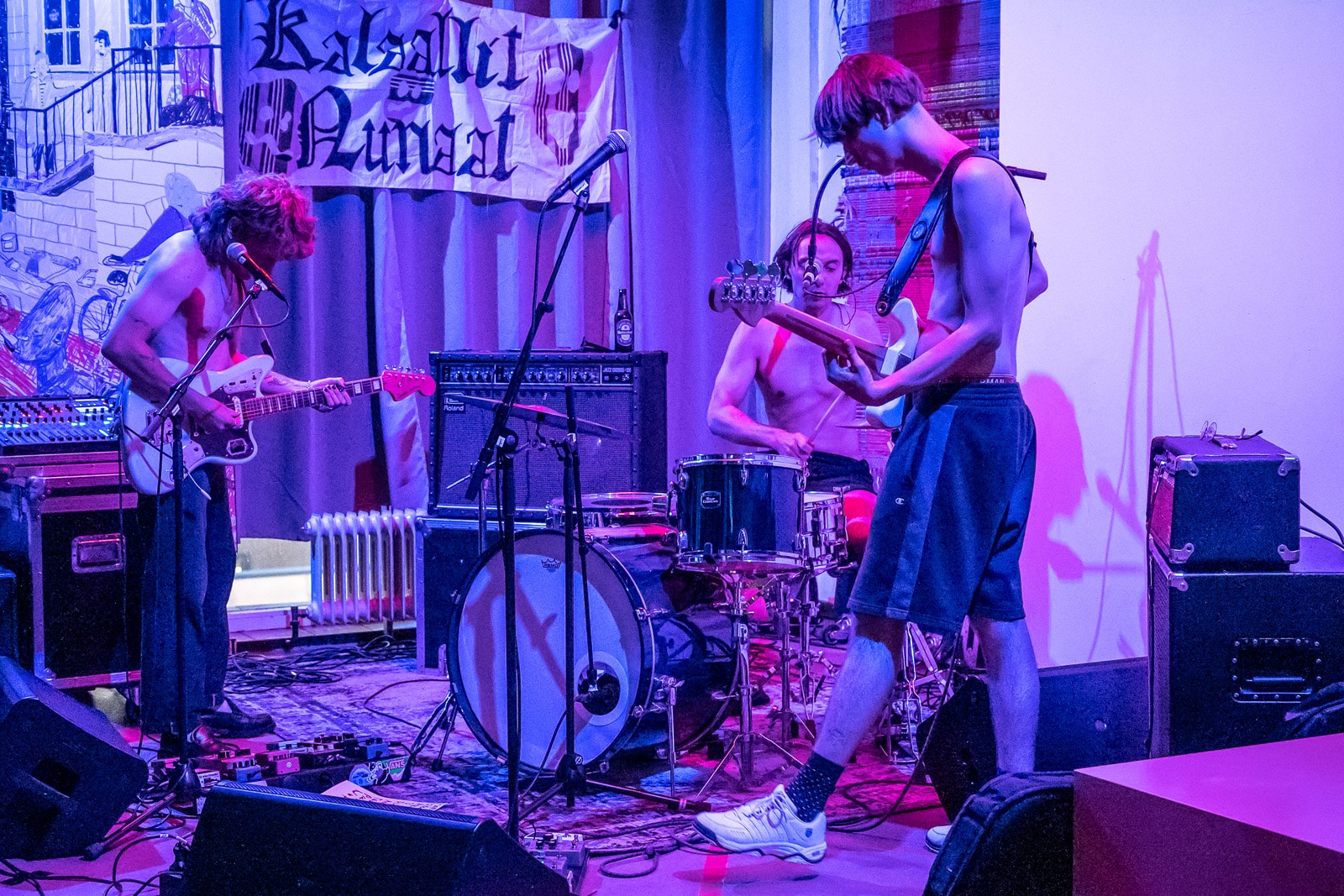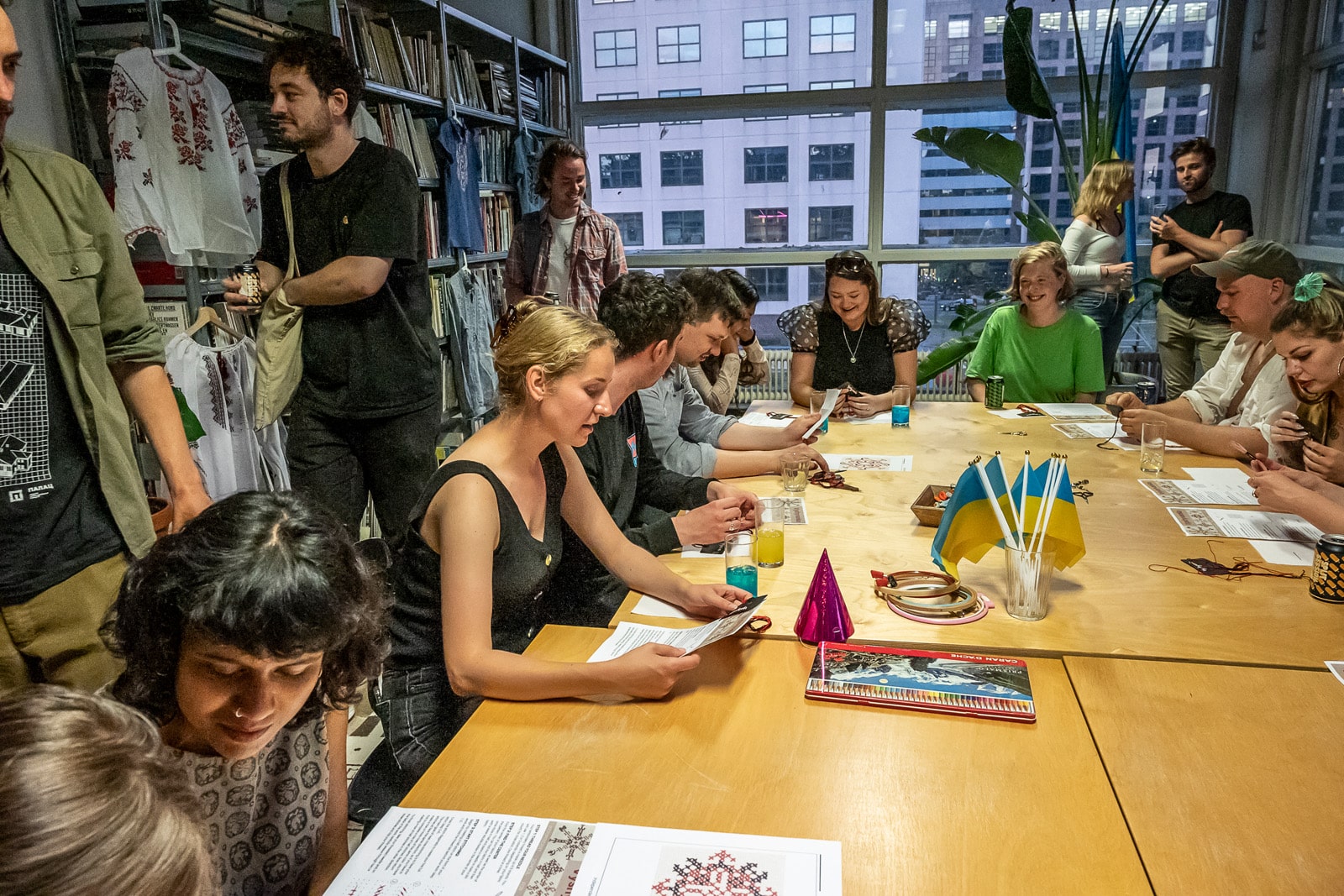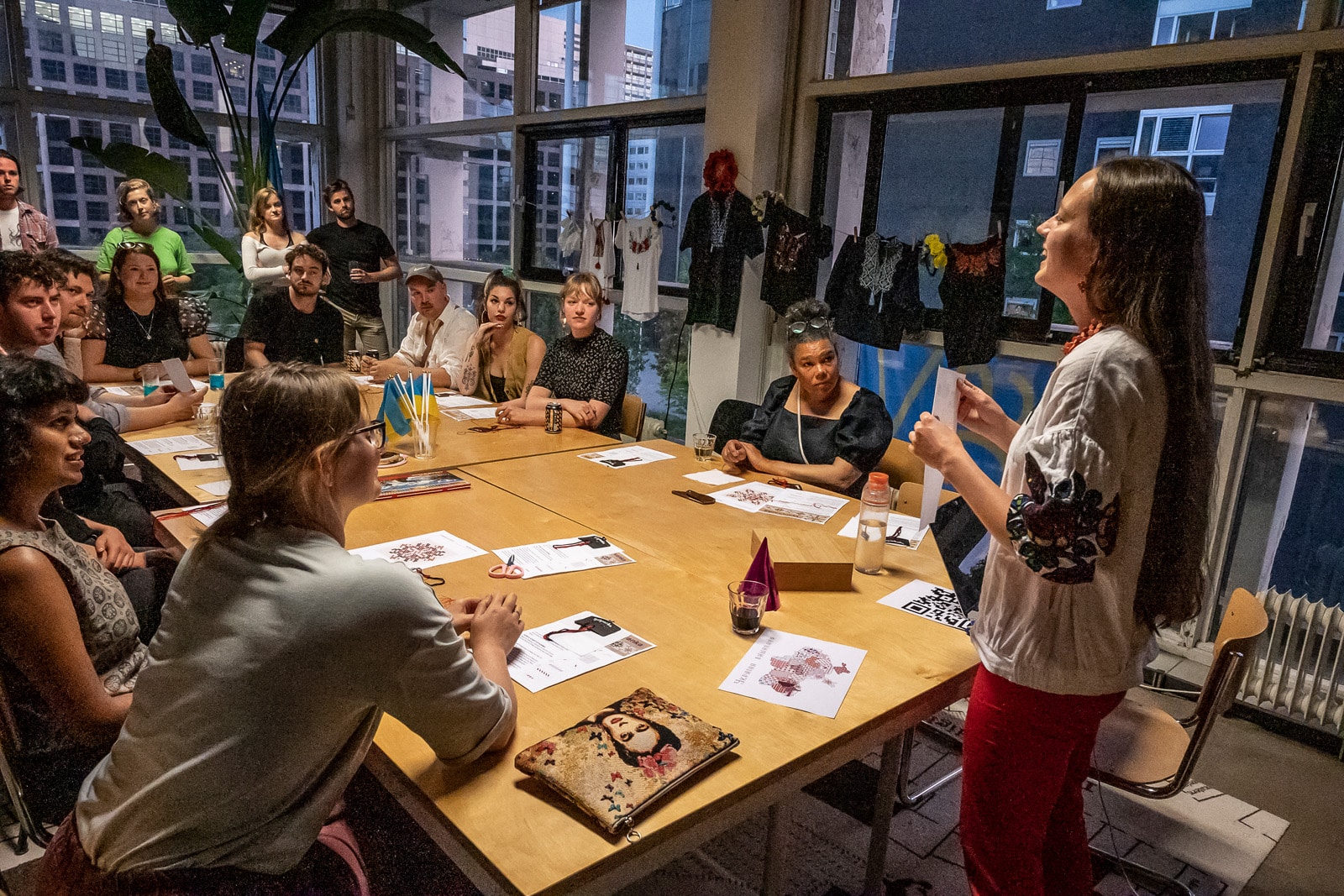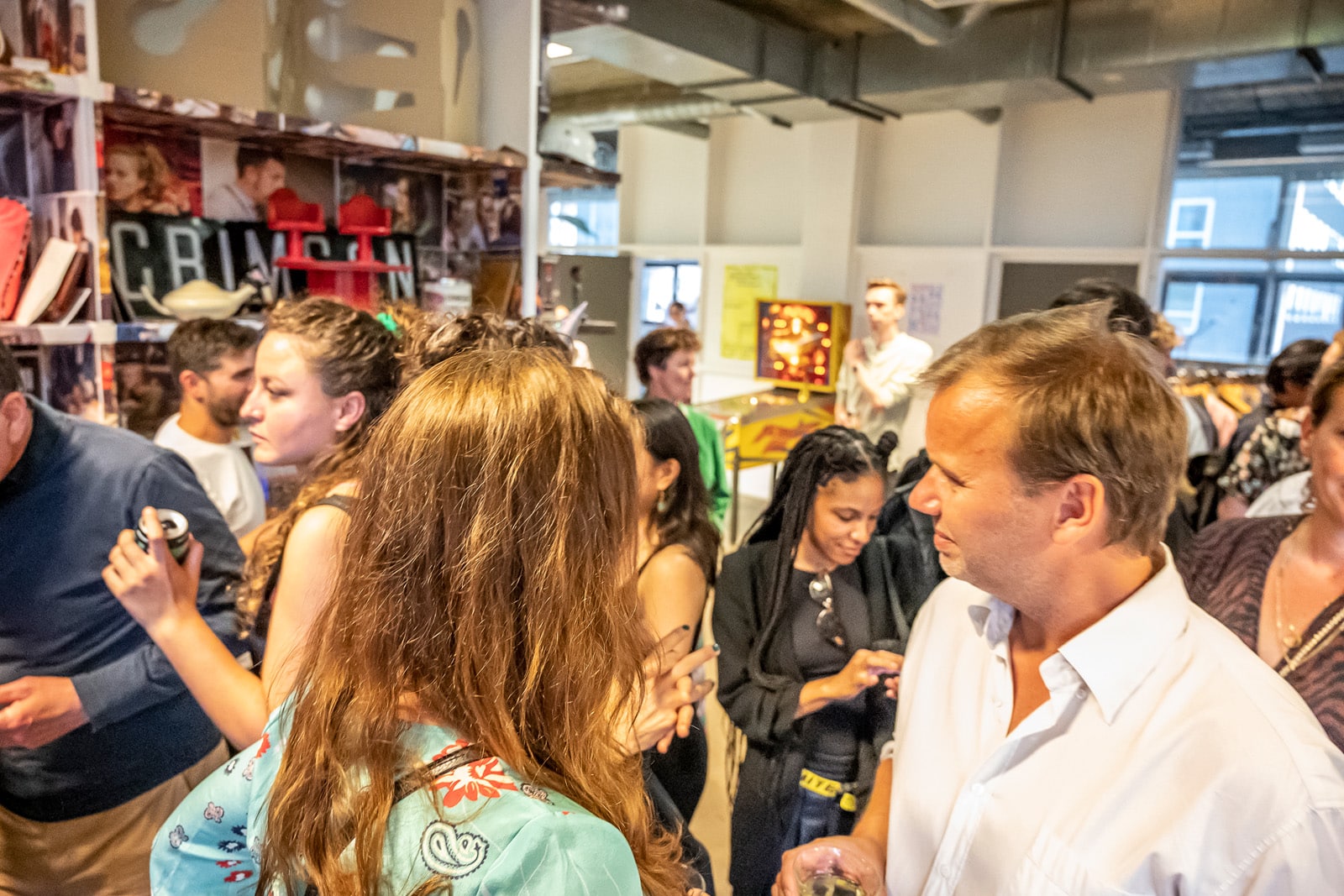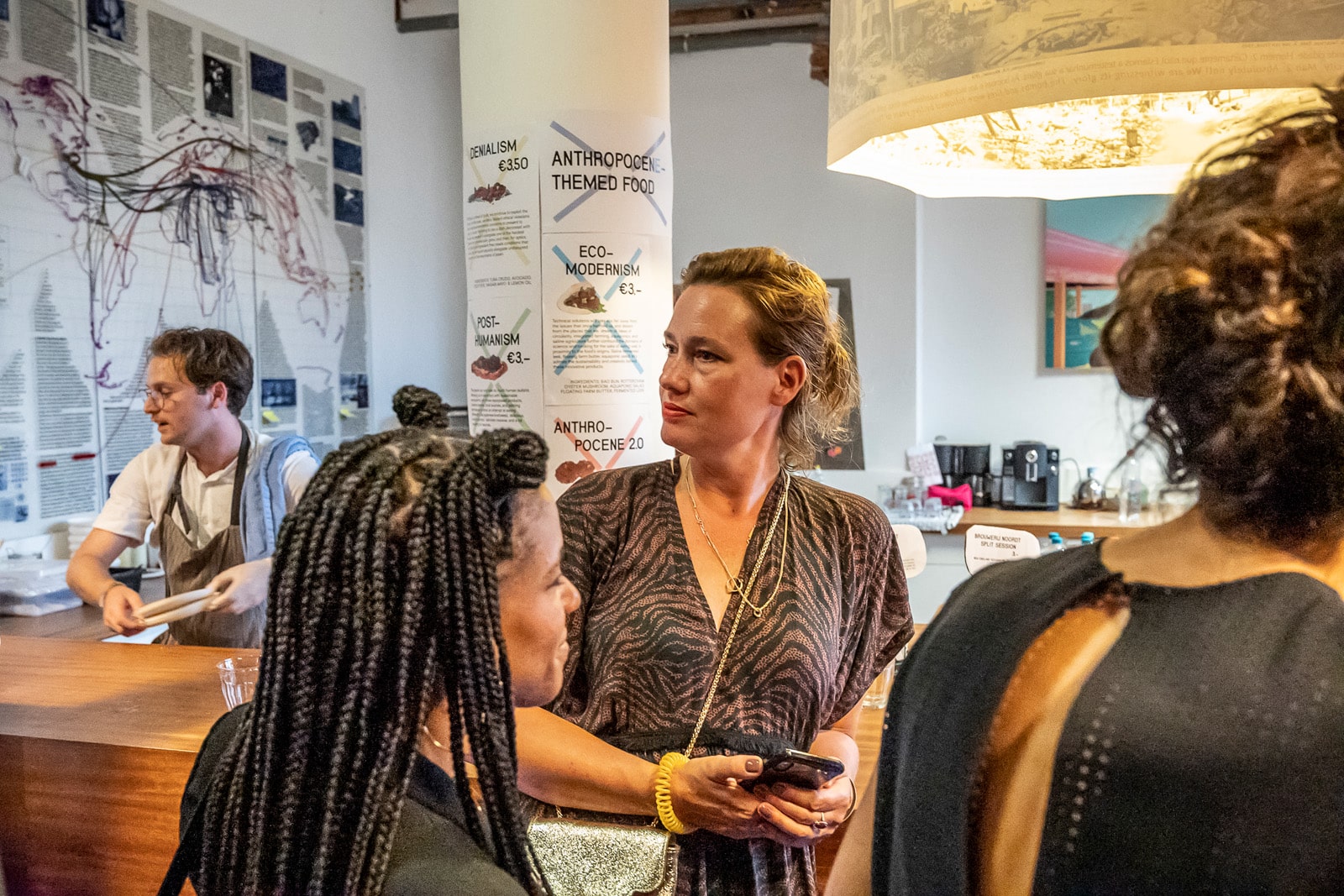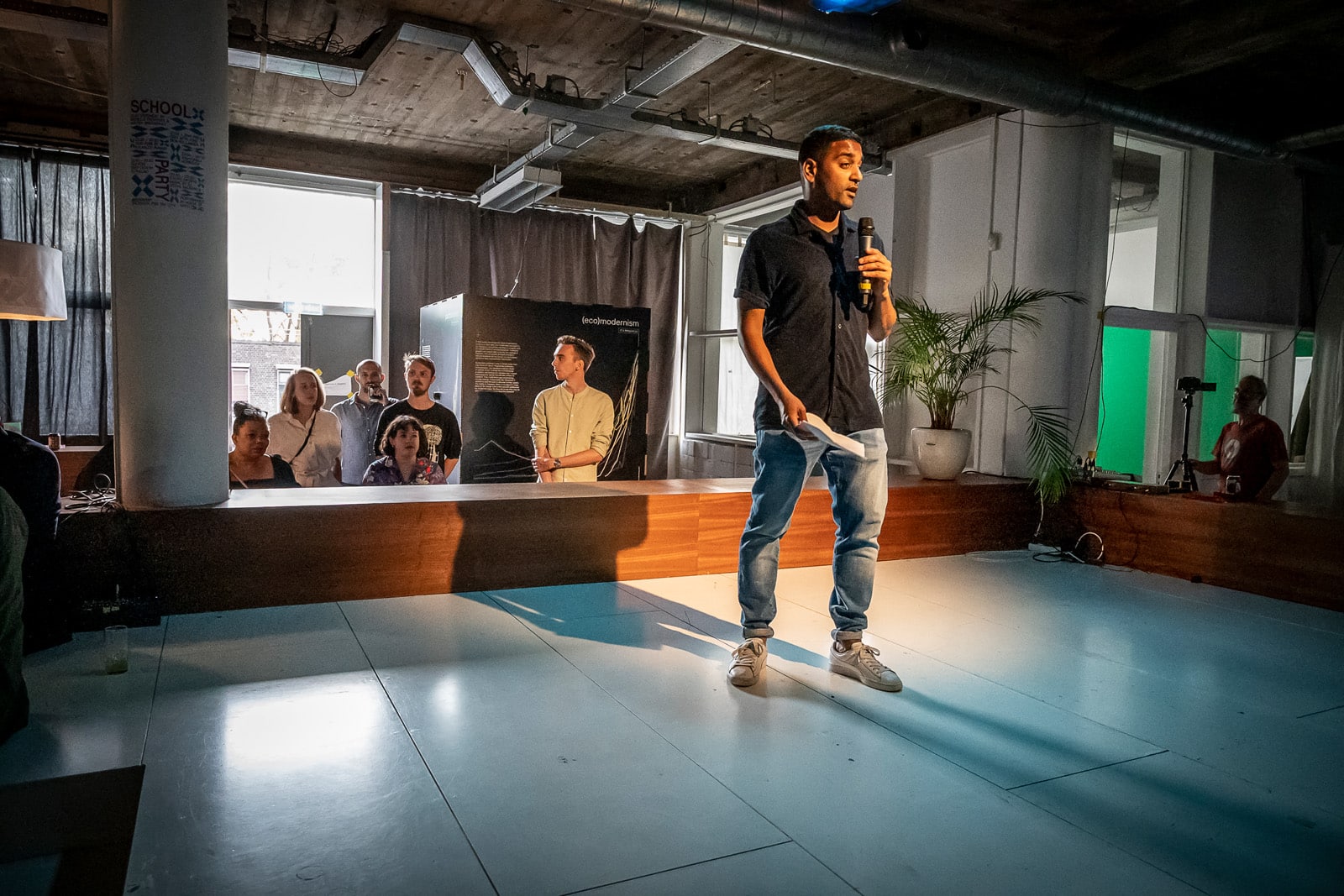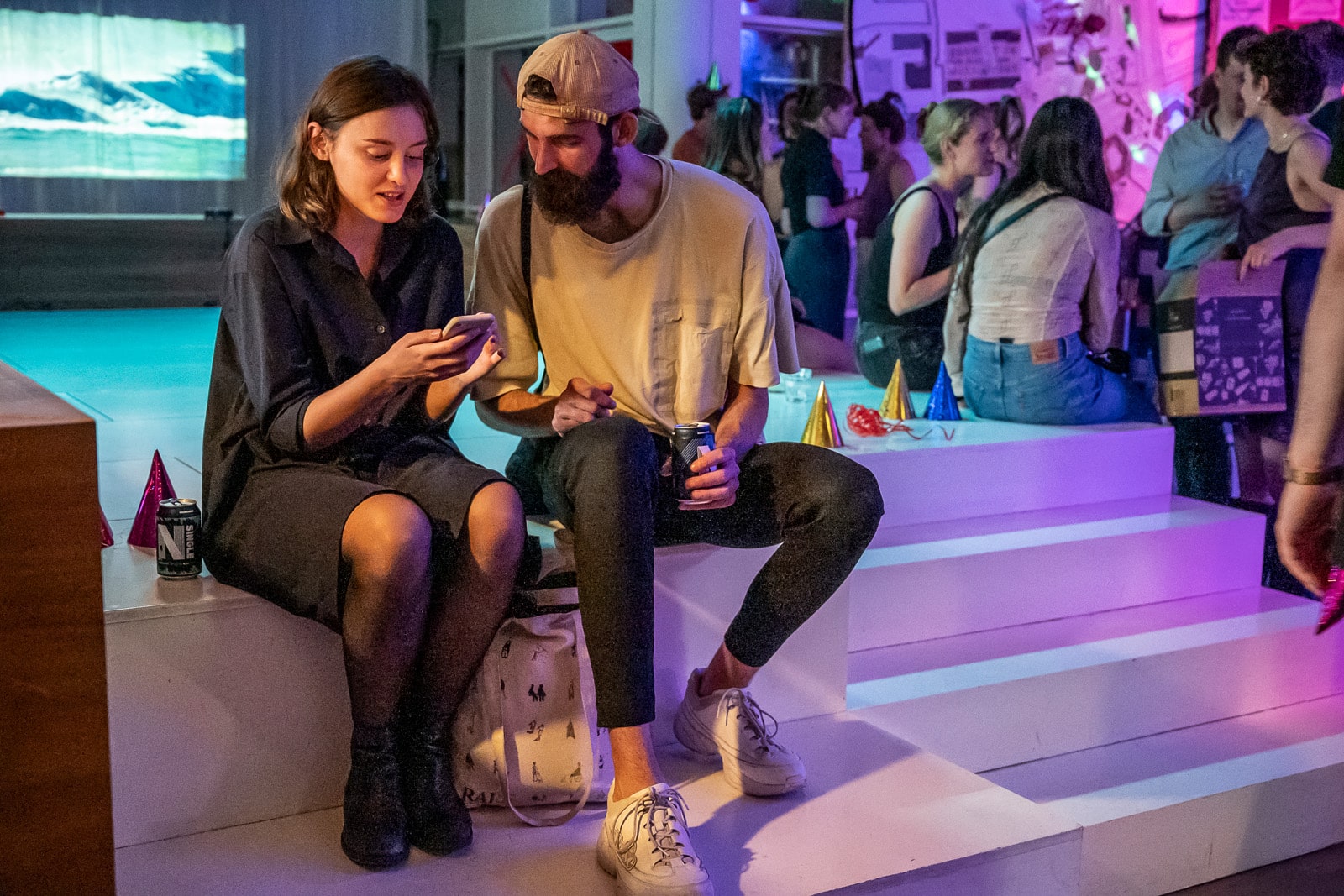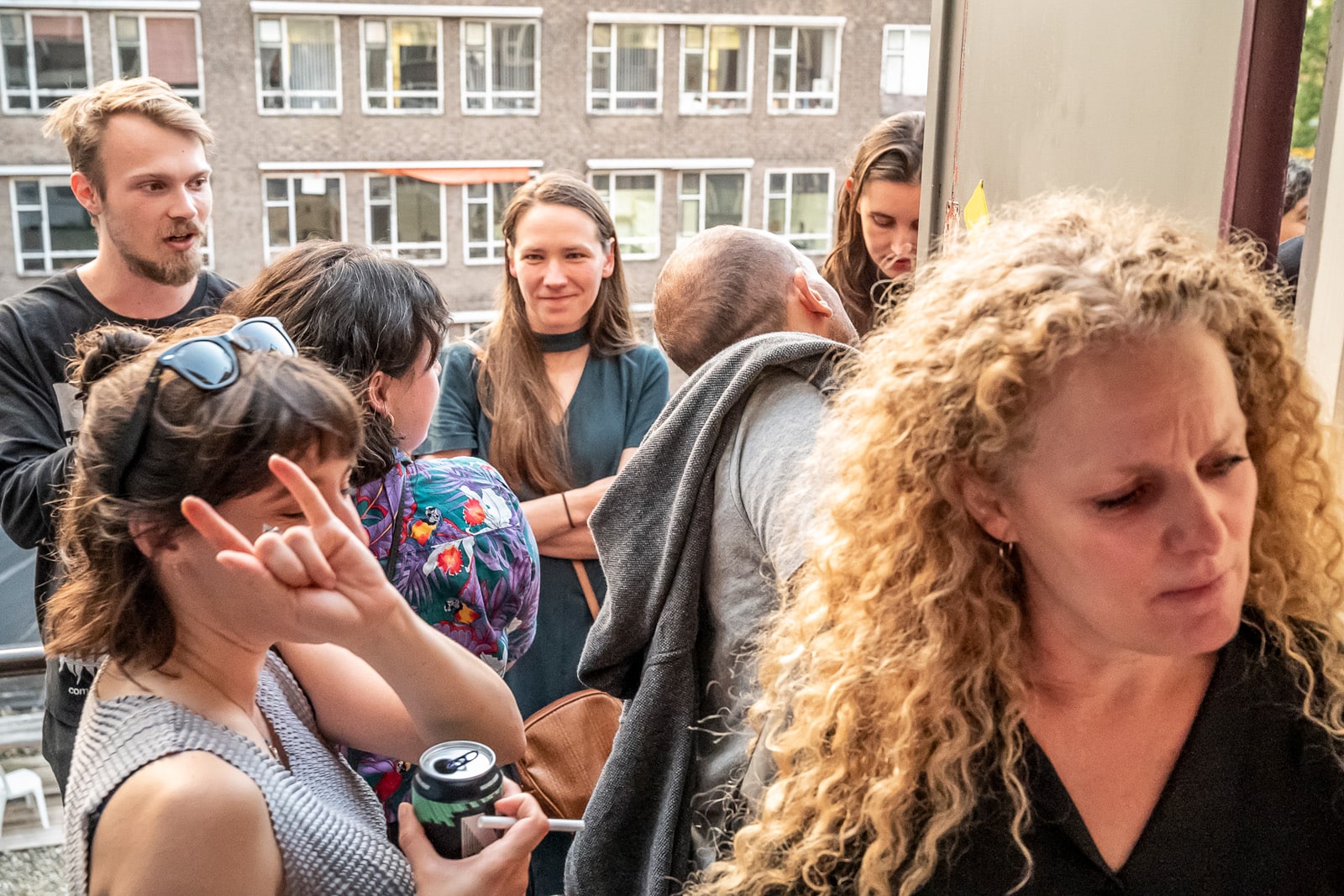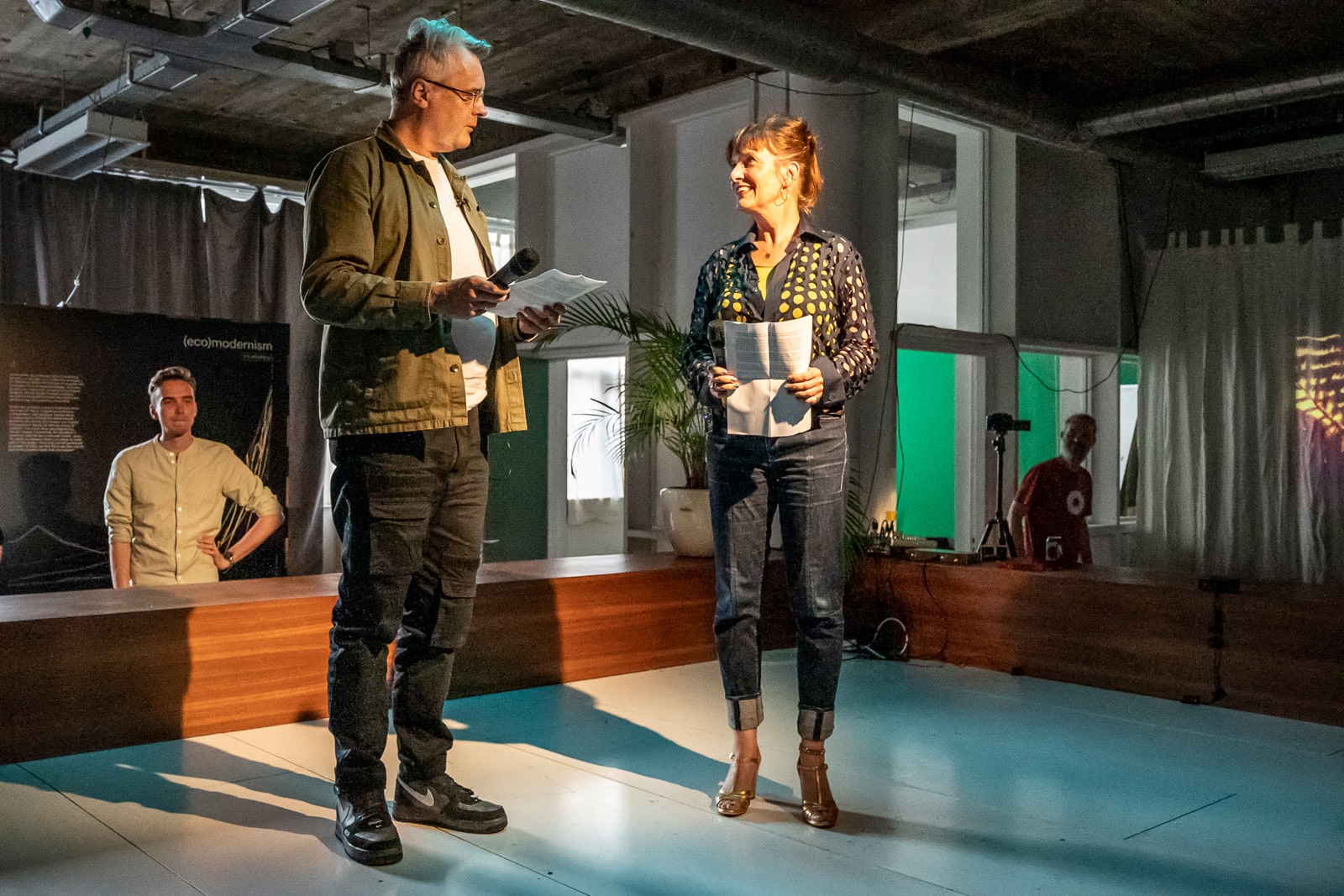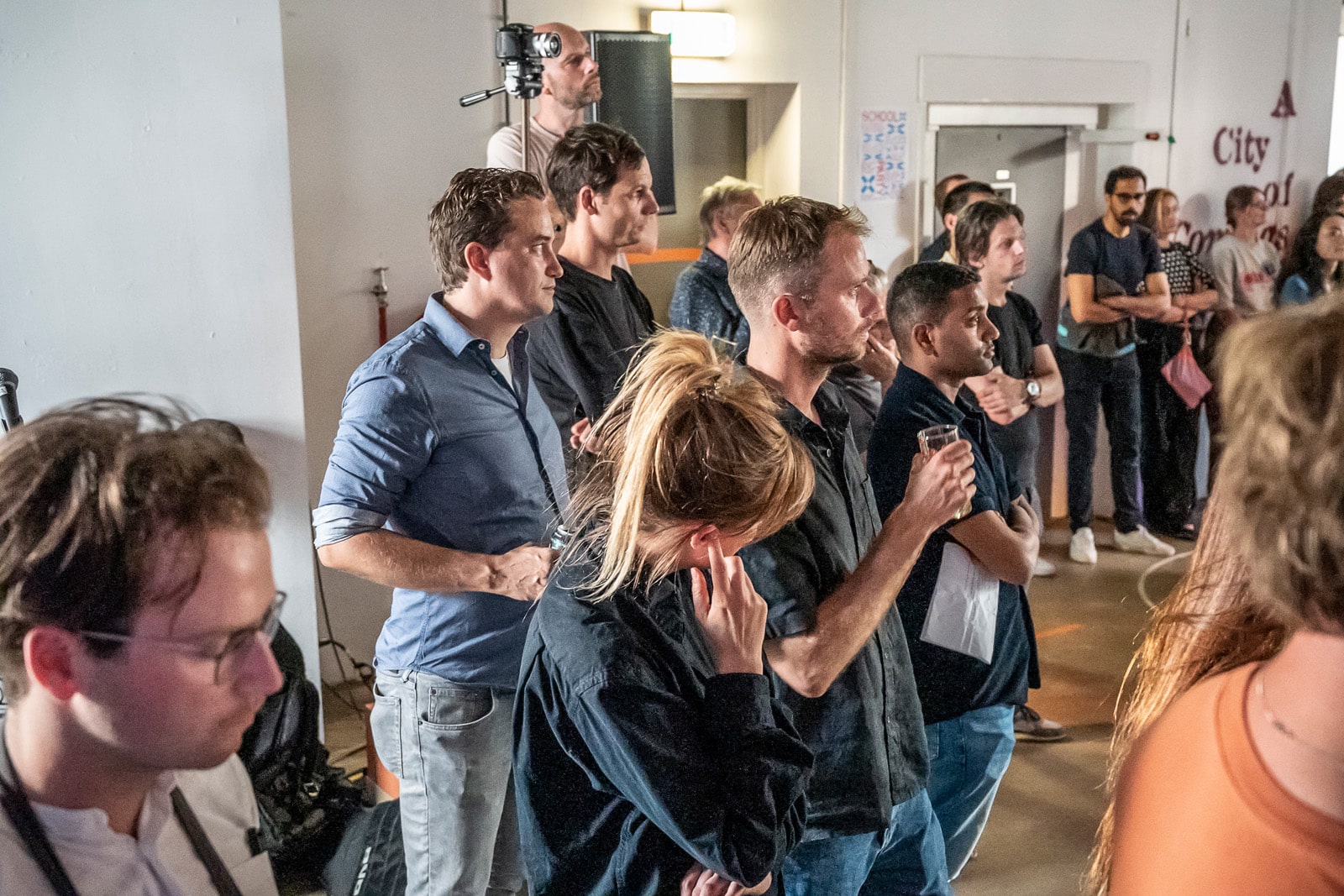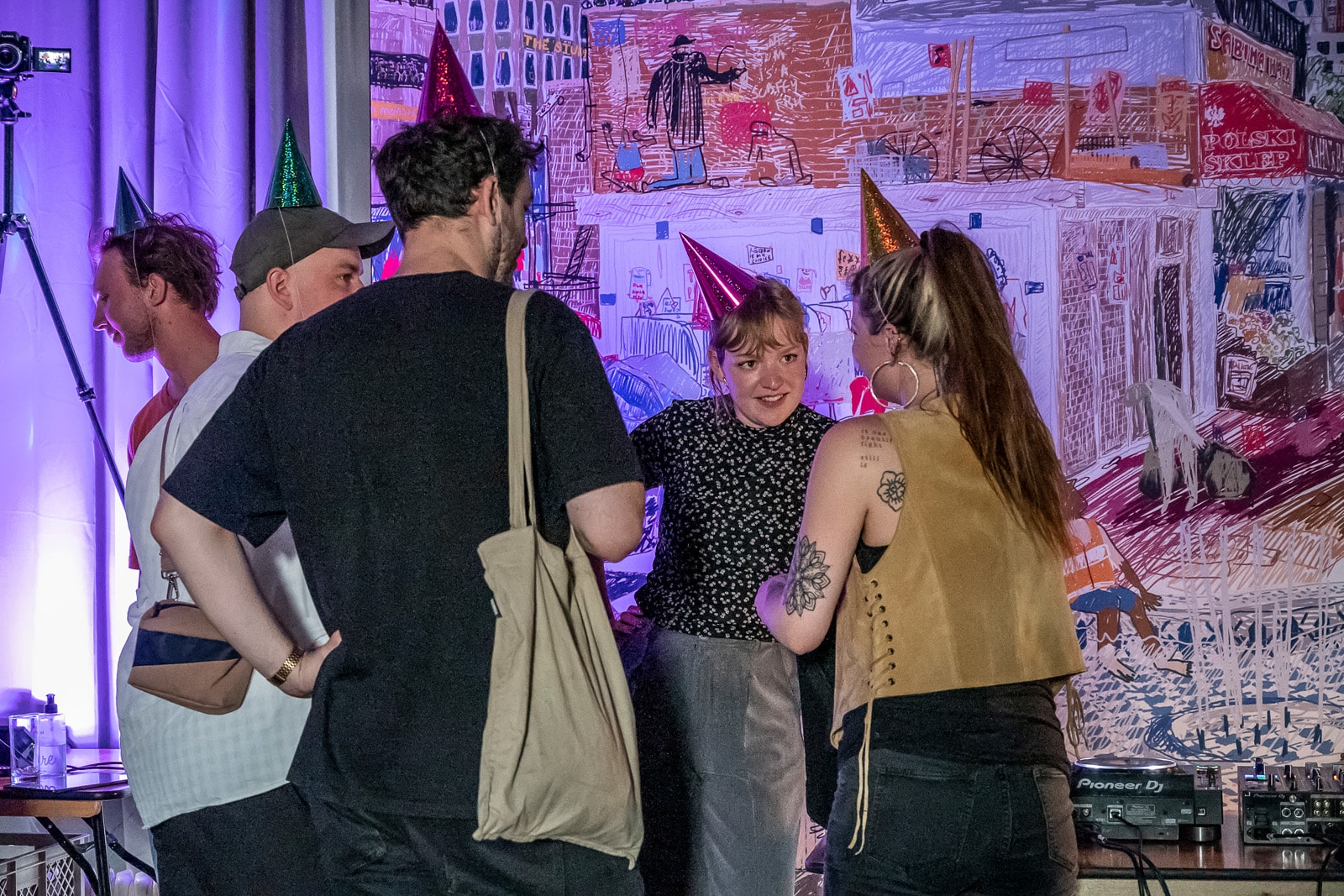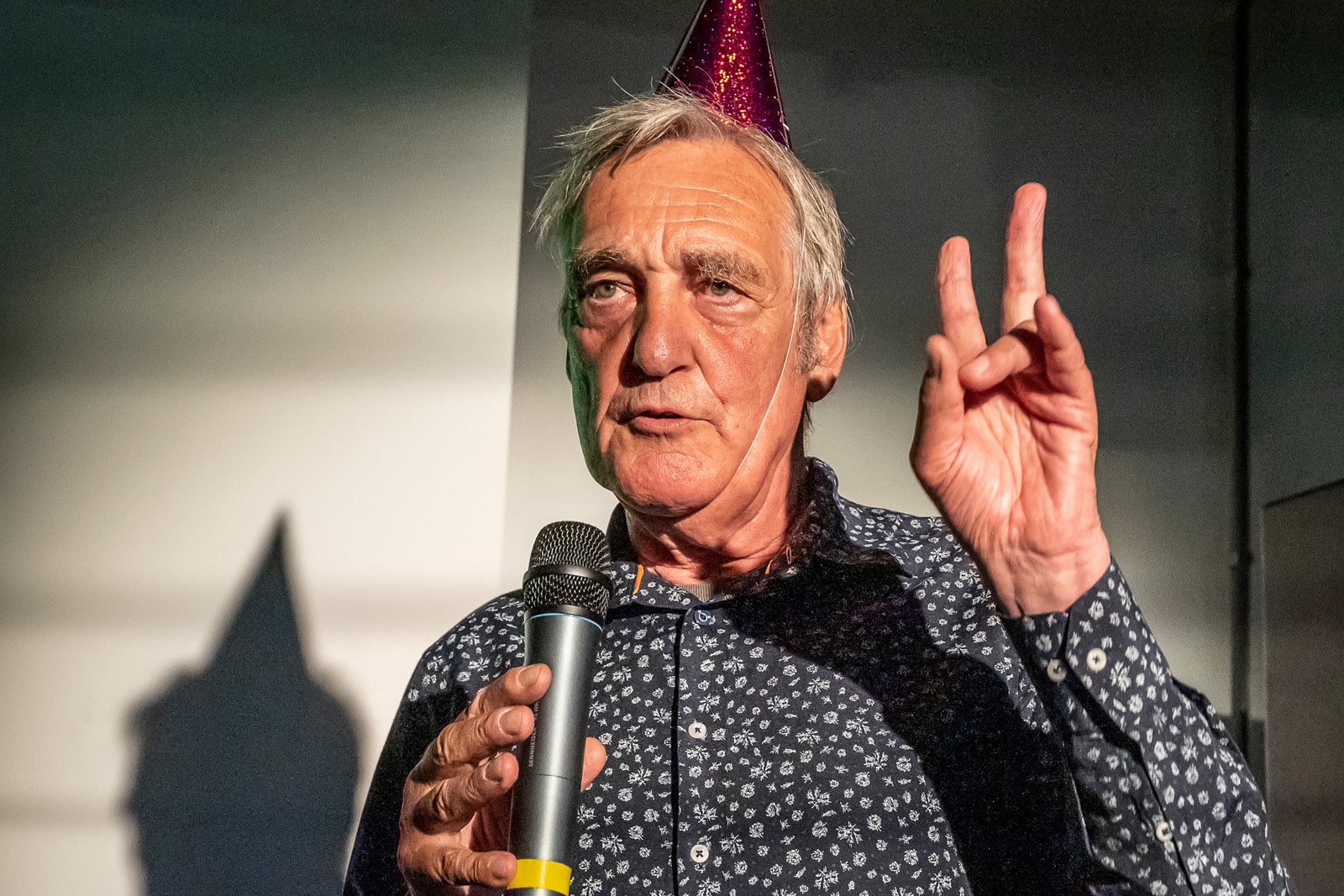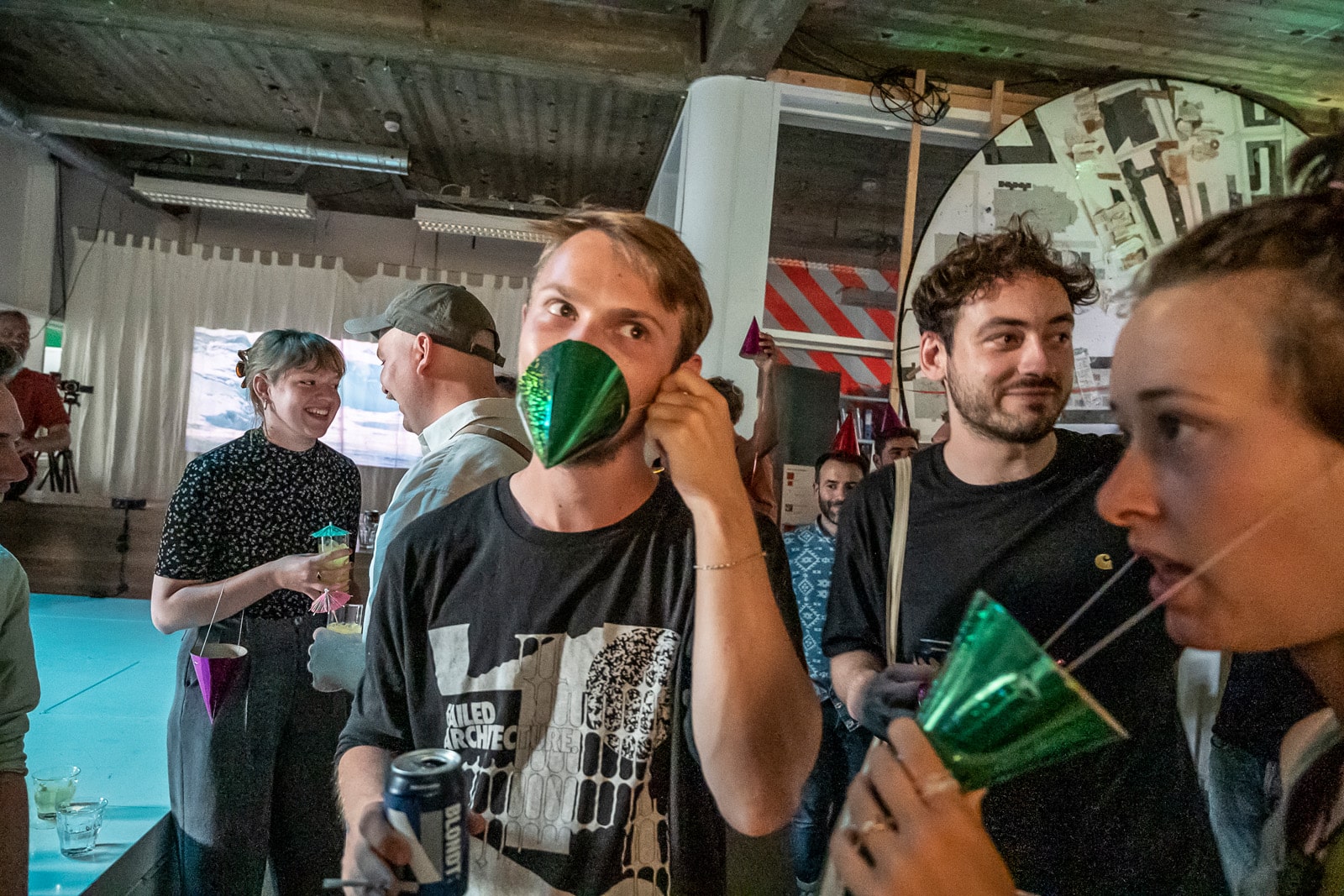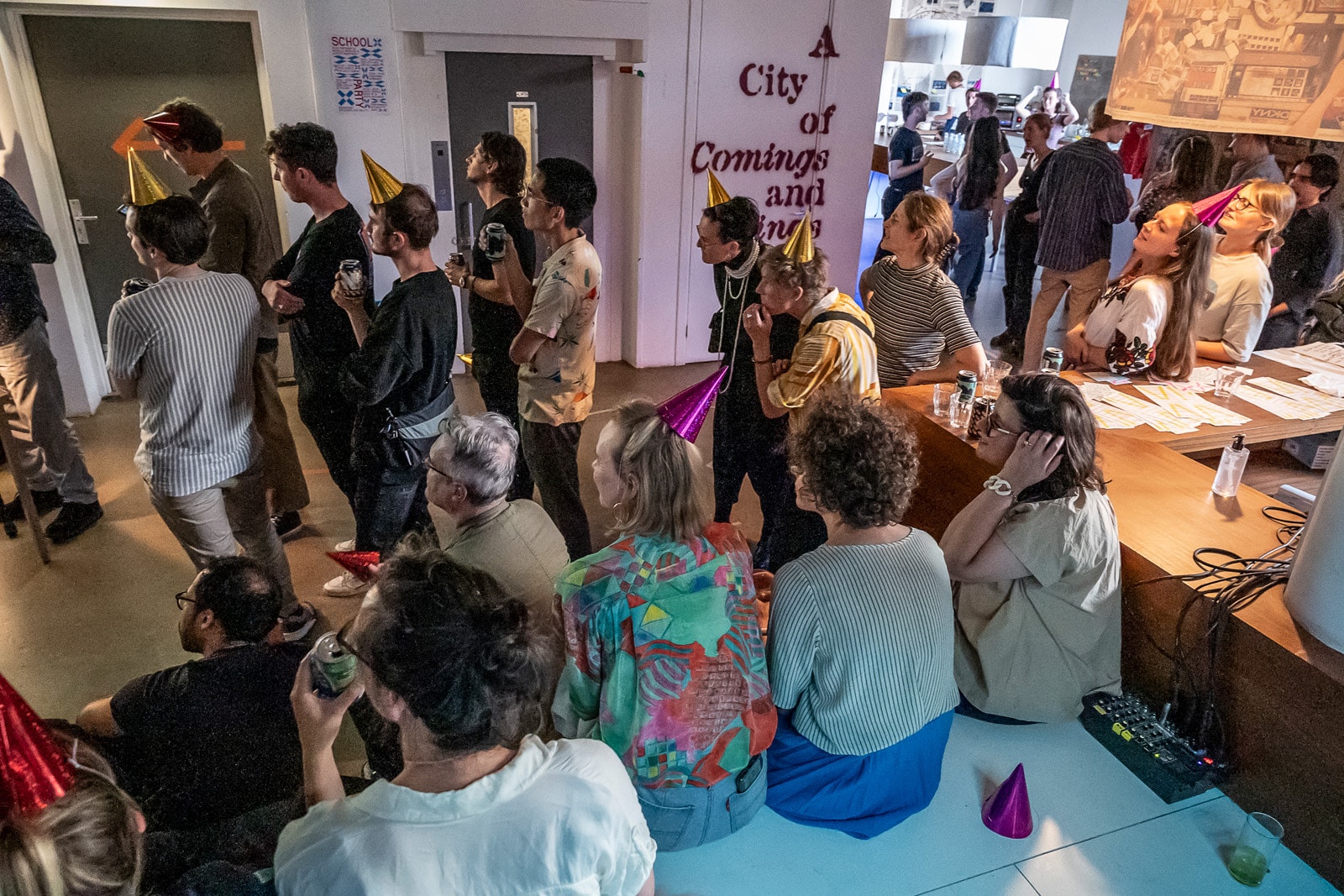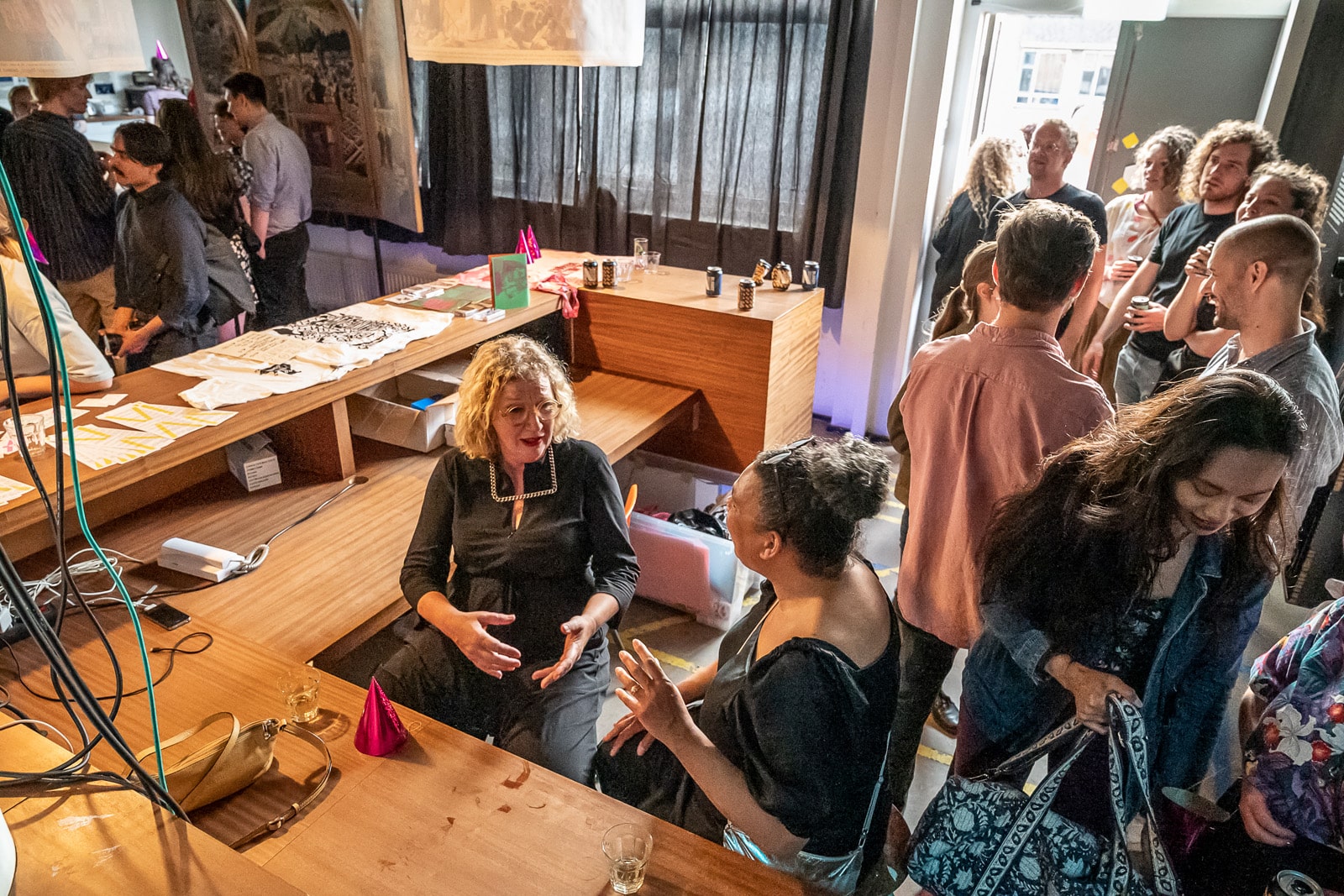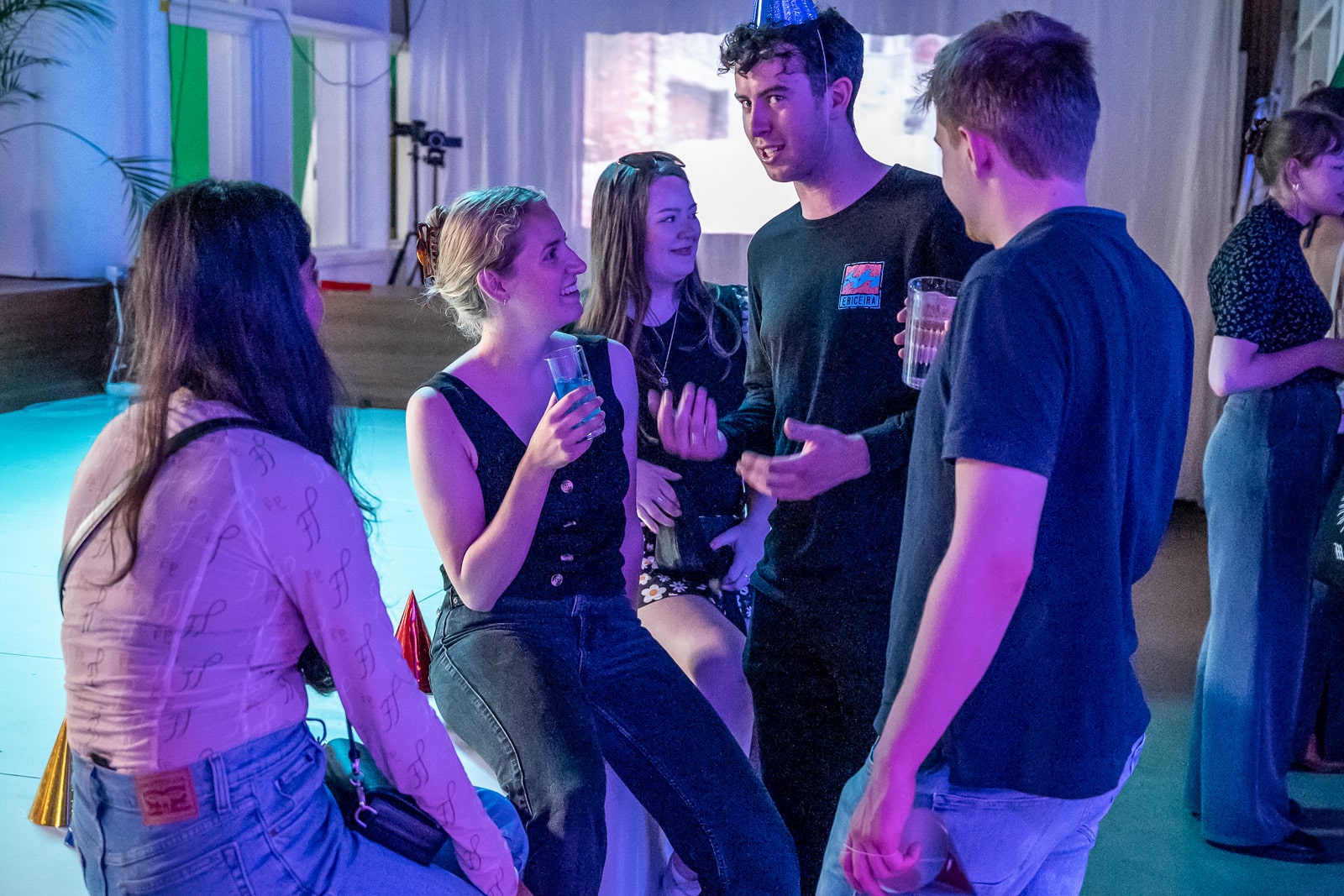School Party 2022
24 JUNE 2022, 20:00 - LATE
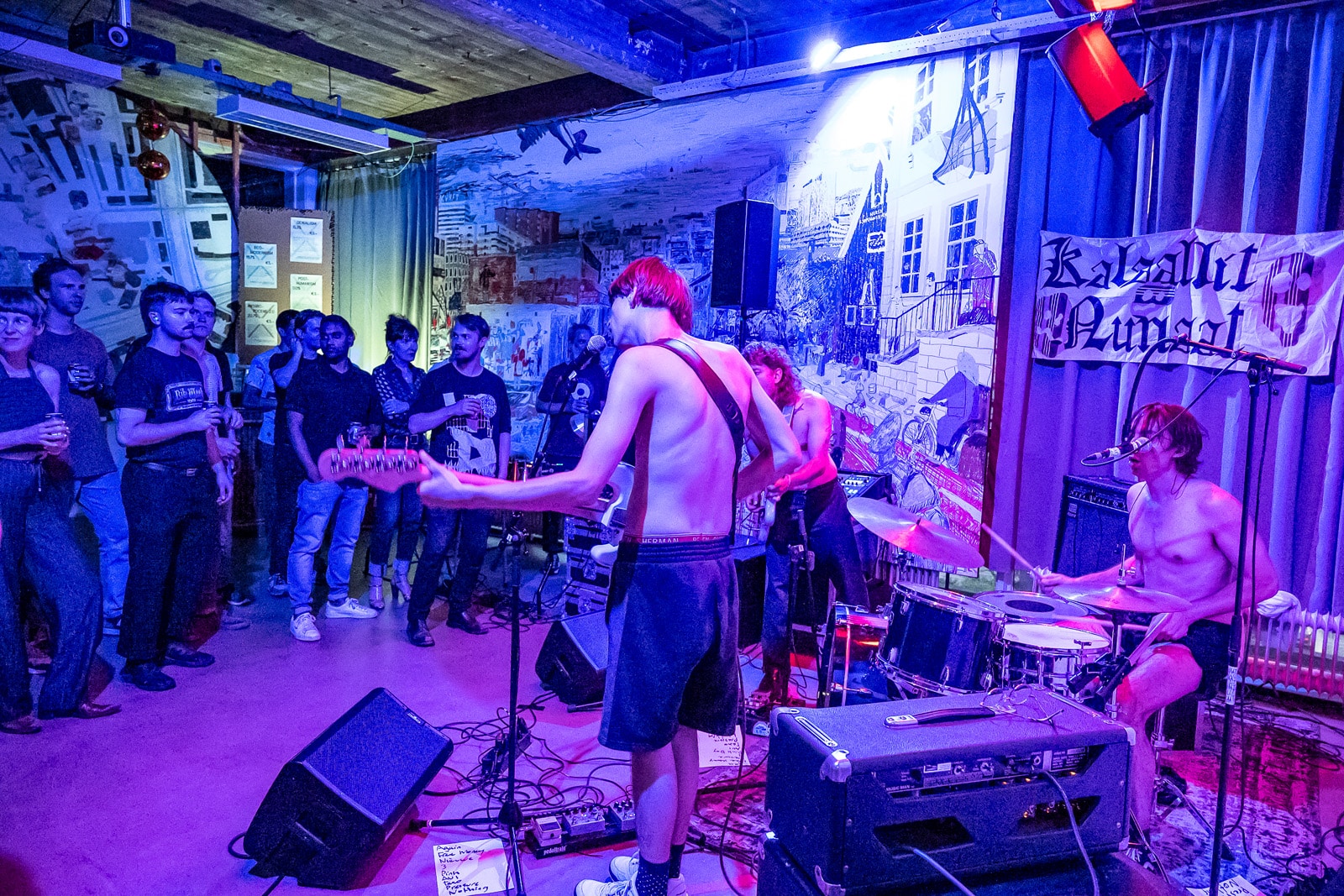
On the 24th of June 2022, we organized another School Party to celebrate the 3rd year anniversary of the school and the beginning of summer. The evening started with the presentation of our programme and a statement by our Dean Team members Michelle Provoost and Wouter Vanstiphout. Afterwards there was a film & architecture pub quiz with Jord den Hollander, performances by the Rotterdam post and noise-punk band Kalaallit Nunaat and performance collective House of Ghod, a Vishyvanka workshop (traditional Ukrainian Embroidery), music by DJ's FullMo and Steve Balearics, and Anthropocene-themed cocktails and bites. The recordings of the statement can be found below.
OPENING STATEMENT "LET’S NOT ALWAYS BE NICE"
Three years ago, the Independent School for the City started out. Since then, more has changed in the world than we would normally expect to change in 30 years.
We have been forced to deal with crisis, to accept mortal threats and to engage with the end of the world. There are so many crises happening at the same time, each of a global scale, that it is almost a certainty that at least one or two of them will not end well. Cracks are opening between the eastern and western spheres of influence, wider than during the Cold War. Politically, democracies are seeing their social contracts being torn up. The damage to the planet and to biodiversity might just be beyond repair.
This wave of crises has provoked an impressive wave of political engagement, international solidarity, scientific inventions and new ways of understanding and describing the world. There has been an acceleration and wider spreading of the climate sciences; the arts are widening their scope including other regions and cultures in the world, even transcending the human race and representing life in its entirety.
We are able to engage in a stronger and bigger way and we are seeing results. Protest and activism are showing that they can be real political forces for the good, as demonstrated by Extinction Rebellion, the Me Too-movement and Black Lives Matter.
Thanks to our imminent destruction, a page of history is being turned.
We are torn by a strange combination of feelings: we feel that things are hopeless, but simultaneously that we must do something about it! And sometimes it seems to work. However, not just the progressive forces know this, also the conservative ones. The Farmers Defense Force in the Netherlands is an example of this. The street has made a huge comeback as a political arena.
Can we honestly say that architecture and urbanism have also contributed to this new engagement, to this force for the good? Can we say that design is stepping up to meet the challenge? Mostly we see an enormous divide with on the one hand large scale corporate design and on the other hand small scale alternative experiments and initiatives. All around us, here in Rotterdam and elsewhere, we see insanely megalomaniac commercial or cultural vanity projects that contribute directly to the destruction of our planet. We see how governments, developers and planners are jamming our green fields with suburban housing and business parks.
And on the other hand, we see tiny community based microprojects, painstakingly made in adobe, cross laminated timber, designed with endless patience together with the community, and presented to an international coterie of progressive architects and art people. There is no competition with the big stuff. At its best, alternative designers are sometimes involved in commercial projects to greenwash the next tower. But where is our Me Too, our Extinction Rebellion, our Black Lives Matter?
We, as a school, also find ourselves deeply committed to the small, the experimental and the precious. Guilty as charged. But, at the same time, we are deeply fascinated and horrified by the systemic change that we are going through. We want to know everything about the inner workings of the institutions and corporations that are in power. We are deeply committed to making the invisible visible. Because surely, that is the first step of resistance, of protest, of creating an alternative choice. Our moral disapproval and good intentions, or even our good actions, are not enough in the face of the machines and the systems that are destroying our cities and our world.
Besides making tiny gestures for the good, we should engage in a pitiless critique of the enemy, to understand as well as possible how it works, where its weaknesses lie, where the possible fault lines in its construction are to be found. This merciless analytical method combined with an endless patience has created the political influence of climate science. That, AND tending to gardens and carrying out small scale experiments. So let us also be mercilessly analytical about construction, about housing, about migration, biodiversity, travel, energy, race and gender.
Let’s not always be nice....
The foundation of the school in 2018 was conceived of as an urban gesture, to create a fact on the ground and help resisting the threat of demolition and gentrification of this part of the city. From these headquarters, our very own watchtower, we looked at the city in as many different ways as possible. Always helped by participants from all over the world.
We tried to understand the Anthropocene in its philosophical and practical consequences. We delved into the underworld to understand how Crime forms a lense through which we can understand the transformation of a city. Together with Failed Architecture we put together an urban critique of the Smooth City, of course with suggestions for ways to find back its democratic roughness. We went out to the streets to discover how superdiversity has changed those streets for good.
As Rotterdammers with friends from Ukraine we had to look at the reconstruction of cities destroyed by war. We sat down and tried to figure out the financial networks and mechanisms that seem to make it impossible to build affordable housing. We did a photographic exploration of the Fossil Economy that our city is so addicted to. And for all these examples of what we do in the sphere of urban critique, Rotterdam was always our point of departure, our guinea pig and petri dish.
But as you all see around you, our space is filling up with strange artifacts, a large tapestry, wrongly reconstructed plates and jugs, adobe building blocks, concrete objects with the imprint of water bottles, and more. These are the results of a series of workshops in which we learned how to weave, how to pour concrete, create building bricks from the soil of Rotterdam and reconstruct pottery with clay. Apart from the obvious fun of it, there is an ideological choice behind this. We want to try and get back to the realness and hereness of materials and objects, to learn how to think with our hands, to let something else pass through our fingertips than I-phones or Laptops. We have been inspired by the decade we grew up in, by the Do-it-yourself mentality of Punk and rediscovery of arts and crafts of the 70s. And we really don’t believe in the barrier between hands and brains that the intellectual ivory tower and our society at large seem to demand, or in the barrier between high art and design on the one hand and the so-called crafts - often done by women or people outside the art world - on the other hand.
In our program for the second half of this year we hope to continue with these combined paths of system critique and very concrete experiments, the combined lines of the huge, worldwide questions and the small tangible projects. Knowing there is very little we can do, we still want to do as much as we can.
In three weeks, we’ll have a Summer School called Fables of the Reconstruction, on rebuilding cities after their destruction, using Rotterdam as a case study but thinking about contemporary destroyed cities.
In September we’ll have the 4th edition of Film & Architecture with Jord den Hollander, looking at the city through the language of film, exploring the theme of the Architecture Film Festival, ‘Freeze Frame’: a moment of self-reflection amidst the turmoil in the world.
Also in September: The Ministry of Make! with ZUS, on the future proof planning of housing in the Netherlands. An attempt to activate the combined knowledge and expertise of Dutch designers by dividing the amount of 1 million houses amongst 100 offices which will be exhibited at the IABR in October.
In October we are working with Charlie Koolhaas in a Research by Photography workshop titled ‘the Rotterdam Dream’. Aiming to tell the narrative of Rotterdam as the most American city in the Netherlands with all its fascinating and appalling aspects.
In November we focus on what a Post-Growth city could be, together with the urban planners of BURA. Expect an exploration of alternative models for a sustainable and just city which is no longer based on the imperative of economic growth.
Sometime during the holiday season we’ll organize a workshop on the ancient but very now art of Vyshyvanka, or Ukrainian embroidery, of which people could get a first taste at our school party.
In December is also the deadline to subscribe to our 3-month course in contemporary urbanism: Dirty Old Town. This is a crash course and a summary of all we know about the methods of architectural history, morphological research, filmmaking, urban sociology and more. We have themed workshops focusing on Superdiversity and the Anthropocene.
Lastly, we as a school, have enjoyed the incredible luxury of setting up our own lecture program, with people we want to hear, in a context we enjoy being in. So far, we have had 26 people from all over the world coming by to talk, present, and inspire us, have a drink and a bite and make plans with. This School’s Out! Program will continue after the summer on the last Friday of each month.
Next to that we are starting a more research oriented lecture series called “Back to School with…”, curated by urban researchers who will invite the thinkers that inspire them. We will start in October with Marina Otero, recent winner of the Wheelwright Prize.
All of our courses are open to all disciplines and all ages, so we invite you all to join our programs and make a change, large or small.
To sum it up: don’t let the crises put you down, or just enough to become aware and active and to create something for the good!

